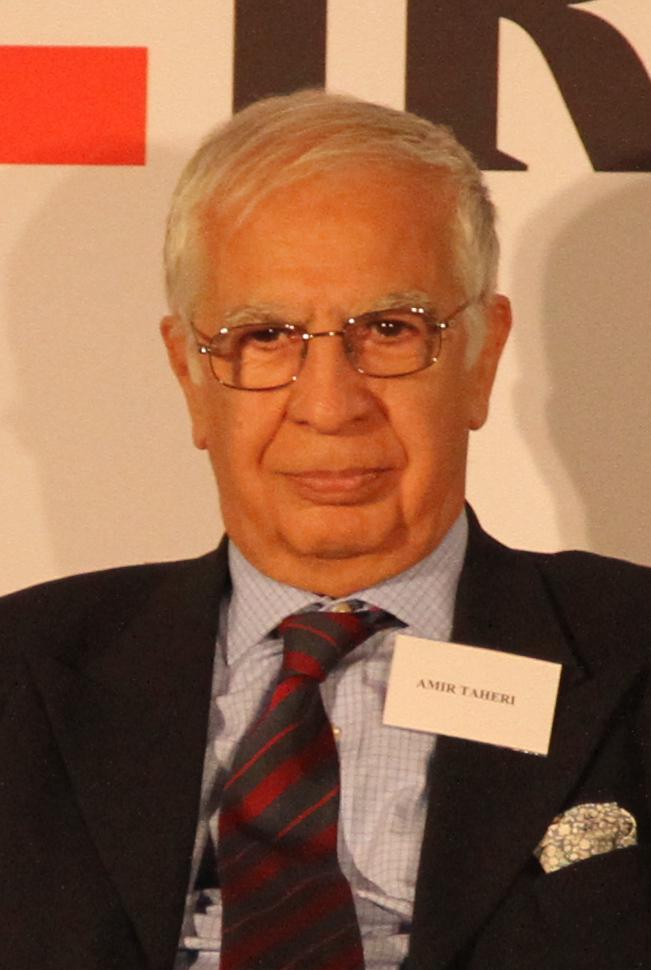Origine: Lo spirito di Allah, p. 43
Amir Taheri frasi celebri
Origine: Lo spirito di Allah, p. 9
Origine: Citato in Finto moderato contro vero duro: povero Iran http://www.ilgiornale.it/news/politica/finto-moderato-contro-vero-duro-povero-iran-1397921.html, Ilgiornale.it, 17 maggio 2017.
Origine: Citato in Coro persiano https://www.ilfoglio.it/articoli/2009/06/16/news/coro-persiano-70374/, Ilfoglio.it, 16 giugno 2009.
Amir Taheri: Frasi in inglese
What US leaders have never understood about Iran http://nypost.com/2015/07/19/what-us-leaders-have-never-understood-about-iran/, New York Post (July 19, 2015).
New York Post
Holy Terror: The inside story of Islamic terrorism (1987)
Opinion: Like Father, Like Son http://www.aawsat.net/2015/02/article55341622/opinion-like-father-like-son, Ashraq Al-Awsat (February 20, 2015).
"Curse of the mummy" http://nypost.com/2011/02/13/curse-of-the-mummy/, New York Post (February 13, 2011).
New York Post
What happens to Western values if no one stands up against Islam? http://nypost.com/2015/01/11/what-happens-to-western-values-if-no-one-stands-up-against-islam/, New York Post (January 11, 2015).
New York Post
The Unknown Life of the Shah (1991)
Opinion: Turkey – Towards a “One and a Half Party” System http://english.aawsat.com/2016/08/article55355819/opinion-turkey-towards-one-half-party-system, Ashraq Al-Awsat (5 Aug, 2016).
The Unknown Life of the Shah (1991)
"How to con the West" http://nypost.com/2013/08/12/how-to-con-the-west/, New York Post (August 13, 2013).
New York Post
The Supreme Guide and the Substance of the Angels http://english.aawsat.com/2015/08/article55344963/the-supreme-guide-and-the-substance-of-the-angels, Ashraq Al-Awsat (31 Aug, 2015).
"Evil reign collapsed years before he fell" http://nypost.com/2011/05/03/evil-reign-collapsed-years-before-he-fell/, New York Post (May 3, 2011).
New York Post
"Beyond terrorism: ISIS and other enemies of humanity" http://nypost.com/2014/08/20/beyond-terrorism-isis-and-other-enemies-of-humanity/, New York Post (August 20, 2014).
New York Post
"Why some Muslims want to kill the Yazidis by genocide" http://nypost.com/2014/08/17/why-some-muslims-want-to-destroy-the-yazidis-by-genocide/, New York Post (August 17, 2014).
New York Post
Forget the Palestinians: Arab states have too much else to worry about http://nypost.com/2015/07/12/forget-the-palestinians-arab-states-have-too-much-else-to-worry-about/, New York Post (July 12, 2015).
New York Post
"Terrorism Cannot Win: This is Why", Elaph.com, (January 16, 2014).
The Unknown Life of the Shah (1991)
"Khadafy, kha-put" http://nypost.com/2011/10/21/khadafy-kha-put/, New York Post (October 21, 2011).
New York Post
"What Saddam’s ouster achieved" http://nypost.com/2013/03/19/what-saddams-ouster-achieved/, New York Post (March 19, 2013).
New York Post
The Unknown Life of the Shah (1991)
Opinion: Turkey – Towards a “One and a Half Party” System http://english.aawsat.com/2016/08/article55355819/opinion-turkey-towards-one-half-party-system, Ashraq Al-Awsat (5 Aug, 2016).
Opinion: The Syrian Orphan and a Club of Cynics http://english.aawsat.com/2015/09/article55345155/opinion-the-syrian-orphan-and-a-club-of-cynics, Ashraq Al-Awsat (18 Sep, 2015).
Opinion: Clinton or Trump – Better or Less Bad? http://english.aawsat.com/2016/11/article55361471/opinion-clinton-trump-better-less-bad, Ashraq Al-Awsat (November 4, 2016)
Who wants a two-state solution, anyway? http://nypost.com/2015/03/20/who-wants-a-two-state-solution-anyway/, New York Post (March 20, 2015).
New York Post
"Have the Mullah's Abandoned their Dreams of Empire?", Elaph.com, (November 16, 2014).
When the Ayatollah Dictates Poetry http://www.aawsat.net/2015/07/article55344336/when-the-ayatollah-dictates-poetry, Ashraq Al-Awsat (Jul 11, 2015).
Few cultures hold the written and printed word in so much awe as Muslims, even though the vast majority are illiterate. When a Muslim wants to clinch an argument he says, 'It is written.'
"Khomeini's Scapegoat", Times, London, (February 13, 1989).
"Brussels is what happens when liberals don’t push immigrants to integrate" http://nypost.com/2016/03/27/brussels-is-what-happens-when-liberals-dont-push-immigrants-to-integrate/ New York Post (March 27, 2016).
New York Post
Opinion: Clinton or Trump – Better or Less Bad? http://english.aawsat.com/2016/11/article55361471/opinion-clinton-trump-better-less-bad, Ashraq Al-Awsat (November 4, 2016)
The Unknown Life of the Shah (1991)
"A league of despots" http://nypost.com/2011/04/19/a-league-of-despots/, New York Post (April 19, 2011).
New York Post
